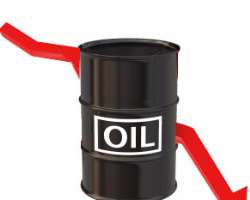Realistic oil price benchmark for 2015 Budget - National Mirror

Recently, it dawned on the nation that the National Assembly would tinker with the $65 per barrel of crude oil set as benchmark for the 2015 Budget. The N4, 357 trillion budget estimates were laid before the Senate and House of Representatives by the Minister of Finance and Coordinating Minister for the Economy, Dr. Ngozi Okonjo-Iweala, on December 17, 2014. Chairman of Senate Committee on Finance, Senator Ahmed Makarfi, told newsmen that his committee had finished work on the revised 2015 - 2017 Medium Term Expenditure Framework (MTEF) submitted along with the budget estimates. But the Senate later hinted that it might adopt $40 per barrel as a compromise benchmark for the 2015 Budget. It must be stated, however, that the average daily production figure assumed for the $65 or $40 oil prices per barrel remained 2.2 million barrels per day. In the course of its debate on the budget on Tuesday, January 14, 2015, the lawmakers unanimously declared that the figures for the price per barrel - the daily production in millions of barrels; and even the purported exchange rate against the US dollar at N165 to $1, would be a triple anomaly that would render the budget non-feasible and, therefore, un- implementable.
This newspaper believes, and has canvassed it repeatedly that the jinx of crude oil price decline is not just a political, but an international economic and geo-political power play. It is a predicament that should be handled with utmost transparency, realism and consultative 'es spirit de corps' among all stakeholders, namely, the Federal Government, which sits at the commanding heights of the Nigerian economy and its direction, and the National Assembly and its committees having one thing or the other to do with the economy. Their responsibility it is to forensically dissect the confusing figures, remedy them where necessary based on subsisting realities, and give ordinary Nigerians not conversant with big and confusing grammar a sense of direction. The National Assembly can, in the interest of the nation, repudiate and return the entire 2015 budget proposal to the executive for necessary revisions, for example.
But in the absence of the realities being embraced by the authorities that should, the Fourth Estate of the realm the press should, as a national imperative, monitor and expose external developments, including oil prices, production trends and the invidious politics of oil and its deployment to achieving geo-political agenda by more powerful nations or regional blocks worldwide. Nigeria's print and electronic media, now preoccupied with the preparations for 2015 elections, should think of the economic prospects of the nation after the polls. They should create platforms for open discourse and debate that should guide and illuminate the policies of the FG and its ministries, departments and agencies (MDAs) in the discharge of their fiscal, budgetary and planning responsibilities.
The polity and the governed must also be enlightened on the causes and effects, the envisaged implications and how the ongoing budget abracadabra would affect their social and economic well-being. Indeed, we make bold to say that the planned 2.2 million barrels per day oil production target is unrealizable, given the significantly reduced lifting patronage by some of Nigeria's major customers, like the United States, etc. Endemic tensions, oil theft and assets disposal by some disillusioned oil bloc-holding majors would compound the bear sentiments and peg the tepid projection to around 1.97 million barrels per day on the average throughout 2015. The naira exchange rate on the very day the Senate debated the subject was about N13 higher than the benchmark for the proposed budget figure. Some say N176 to the US dollar would be more like it.
Foisting a deficit budget on the nation from the onset would spell disaster for an economy that could do with a massive dose of enhanced sense of realism and adopting pragmatic measures in the management of its fiscal affairs in 2015. Let Nigeria stop fooling itself. The country should align with realities that would likely be, and not deceits it wouldn't wish for even her enemies. Making citizens live endlessly on false hopes that things would be rosier, when the opposite is always the case, is deceitful and unacceptable. Hallucinating on a budget of N4, 357 trillion for 2015, as against N4.6 trillion for 2014, when oil prices hovered around $114 per barrel or higher, is taking lies or mother luck too far. It does not portray the FG as reflex conscious.
